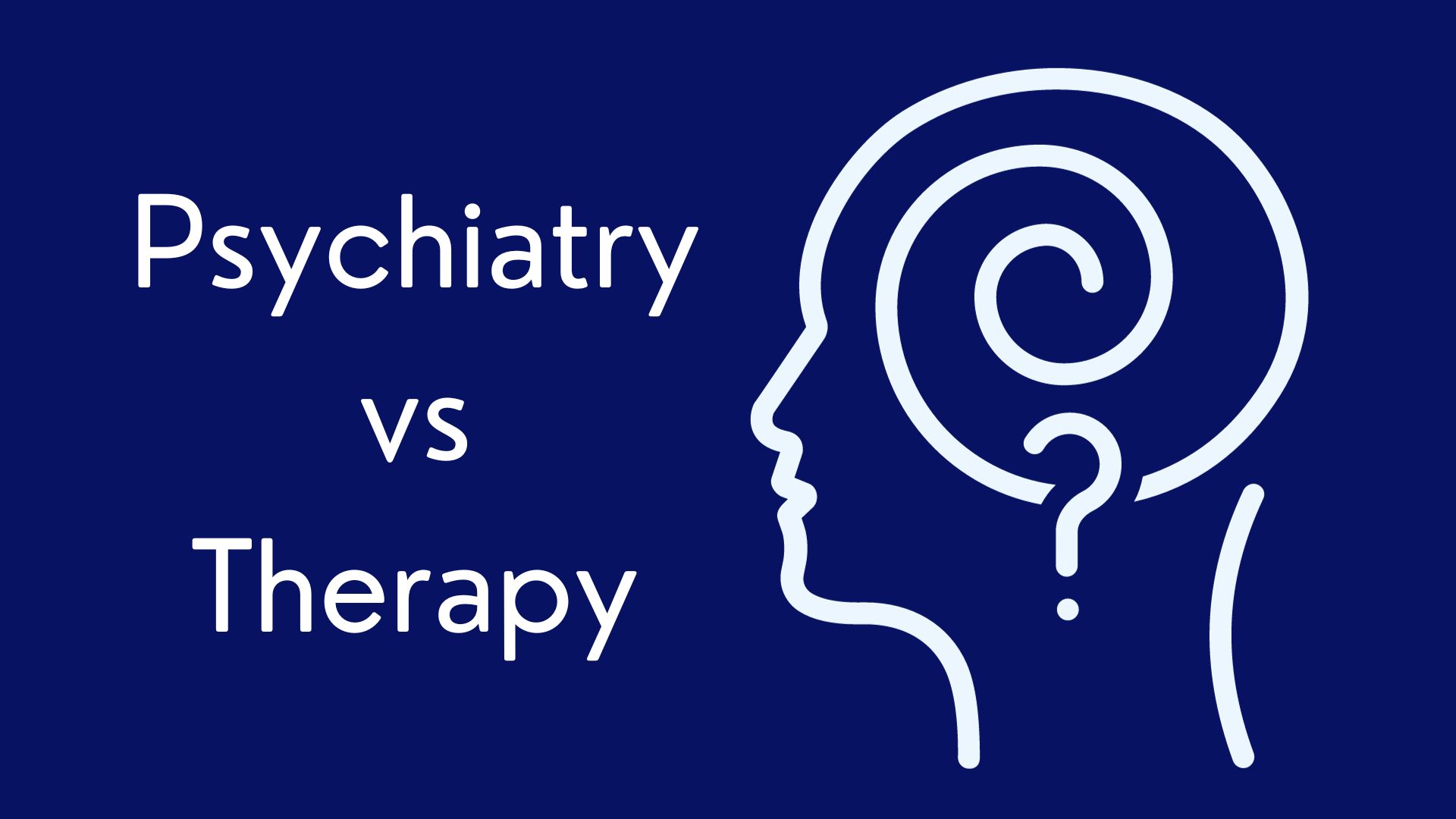Many people struggling with a mental health challenge find two treatment paths – psychiatry and therapy. While both treatment options are focused on helping a person manage symptoms of a mental disorder, there are key differences you should understand. Psychiatrists are doctors who can diagnose and treat mental health disorders using medication. On the other hand, therapists are licensed mental health professionals who use talk therapy to help you manage emotions and behaviors. Therapists can not prescribe medication. Both providers work to better your mental health, just in different ways.
Psychiatry vs. Therapy: Understanding the Basics
What is Psychiatry?
Psychiatry is a medical field that specializes in mental health. With at least 11 years of training, including a medical school and four-year residency, psychiatrists have the qualifications to diagnose various mental health disorders like depression and anxiety. They can also prescribe medication as part of a treatment plan.
Psychiatrists’ extensive training equips them to offer a balanced approach, combining psychotherapy and medication management for mental health issues.
What is Therapy?
Therapy, often called psychotherapy or counseling, involves discussing emotional and behavioral issues with a licensed professional. Therapists use methods like cognitive behavioral therapy (CBT) to help you manage stress or irrational fears. They typically hold a master’s or doctorate and focus on conversation-based healing, not medical treatment.
Therapists often work with psychiatrists for cases where talk therapy methods like CBT may not fully address severe mental health disorders. This collaboration allows for medication options and further diagnosis.
Understanding Key Differences
Understanding the differences between psychiatry and therapy can shed light on the mental health resources available to you. Here are the key distinctions:
- Ability to Prescribe: Psychiatrists can prescribe medication; therapists cannot.
- Educational Background: Psychiatrists are medical doctors with extensive training. Therapists generally hold degrees in psychology or social work.
- Approach to Treatment: Psychiatrists often incorporate medication into treatment plans, while therapists use talk-based methods to improve mental health.
Why the Difference Matters
Prescription Medication vs. Talk Therapy
Psychiatrists can prescribe medication like antidepressants or antipsychotics to treat mental health conditions. These medications target chemical imbalances in the brain. On the other hand, therapists use individual therapy and group therapy, focusing on cognitive and emotional issues, without prescription.
A Comprehensive Mental Health Treatment Plan
A psychiatrist often plays the role of a medical overseer in your mental health care, managing medications and coordinating with other healthcare providers. Therapists focus more on regular emotional support and behavioral change. Both can collaborate on a comprehensive treatment plan to provide a rounded approach to mental health care.
When to Consider Psychiatry
Signs You Might Need Psychiatric Services
If you’re experiencing symptoms that disrupt daily life, psychiatry is the route to consider. Specific signs include:
- Extreme mood swings
- Suicidal thoughts
- Hallucinations or delusions
- Bipolar disorder
- Depression
- Anxiety disorders
- ADHD
- Autism
Benefits of Psychiatry
A psychiatrist provides a medical approach to mental health. Benefits include:
- Ability to prescribe medication
- Medical tests to rule out other mental health issues
- Evidence-based treatments for severe symptoms
When to Consider Therapy
Signs You Could Benefit from Therapy
A therapist can be your go-to for managing emotional issues. Watch for these signs:
- Feeling overwhelmed
- Relationship issues
- Mild anxiety or depression
- Grief
- Stress
- Relationship issues
Benefits of Therapy
Therapists offer a non-medical approach to mental well-being. The benefits are:
- Safe space to express emotions
- Coping mechanisms for stress and anxiety
- Talk therapy to explore your thoughts
How Psychiatry and Therapy Work Together
Navigating mental health issues can be easier with a psychiatrist and a therapist on your team. Together, they offer a well-rounded, evidence-based approach to your wellness.
Offering A Balanced Mental Health Approach
A psychiatrist diagnoses and prescribes medication for depression, anxiety, or bipolar disorder. The medications balance your brain chemistry to help you feel stable. Often, psychiatrists refer you to a therapist for talk therapy to further support your healing.
Conversely, a therapist helps you tackle emotional and mental challenges through conversation and behavioral techniques. They may suggest seeing a psychiatrist if medication could benefit your condition. The combined approach of psychiatry and therapy provides comprehensive support for a more vital, stable mental well-being.
The Final Takeaway: Psychiatry vs. Therapy
Psychiatry and therapy serve as two unique routes to better mental health. Psychiatry often relies on medication for symptom relief, while therapy provides a safe space for long-term emotional growth through talk-based methods. Understanding these differences helps you choose the right path for your mental health. If talk therapy doesn’t fully address your needs, consider specialized psychiatric services like those Embrace Health offers.
Ready for Mental Wellness? Choose Embrace Health
Tired of the hassle that comes with traditional mental health care? At Embrace Health, we cut through the noise. Enjoy tailored psychiatric treatment from board-certified experts, all from the comfort of your home.
Why Embrace Health?
- Online Convenience: No more waiting rooms or long commutes—get your psychiatric care from home.
- Expert Care: Our board-certified psychiatrists create a treatment plan just for you.
- Medication Management: Our expert psychiatric team precisely handles your prescriptions after a thorough evaluation.
Why settle for less? Whether you’re an adult or caring for a child as young as eight, Embrace Health offers specialized, convenient care to help you reach your mental health goals.
Contact Us Today
Call (515) 612-9583 for immediate assistance, or email us at [email protected]. You can also fill out our contact form to start your journey towards better mental health with Embrace Health.


